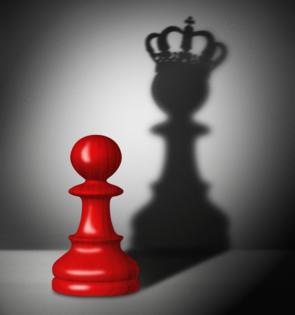What is the 'shadow self' and why is everyone talking about their hidden desires?
Published in Lifestyles
Earlier this year, a spiritual coach and reiki healer who goes by the name Zen Oasis posted a video to TikTok explaining the idea of "the shadow self" to her 167,000 followers.
Sitting lotus-style in a yellow halter top with a stick of sage smoldering in one hand, the Atlanta native described an exercise she did to become acquainted with her own shadow — a term coined by the early 20th century psychologist Carl Jung to describe the parts of our psyches that we have buried deep in our subconscious.
"I sat down and wrote down all the things I can't stand about people. The things that really got me like, yech, ick," she said, one hand raised in disgust. "Then I looked at that really long list and took my top five, and I was just like, 'You know what? This is me. This is me all day.'"
"It might sound a type of way," she said. "But this was the best way for me to see the things I can't see about myself."
The video, which has been viewed more than 36,000 times, is just one of over 48 million on the social media platform that explores the topic of shadow, and one more piece of evidence of a wide-ranging resurgence of Jungian fascination.
"People are really uncertain about the world and where it's going to go and they are coming to Jung because they want to find solutions," said Christophe Le Mouel, director of the C.G. Jung Institute of Los Angeles.
At a time when conversations around self-discovery are surging, the analyst's theories on the collective unconscious, archetypes and shadow are increasingly influencing the work of social media-savvy healers, therapists and life coaches. It's also the inspiration for new tarot-like card decks, thought provoking Etsy prints and the recently published "The Shadow Work Journal" that sold more than a million copies thanks in part to a wildly successful TikTok marketing campaign.
Sixty-three years after his death, Jung's ideas — especially the concept of the "shadow" — are having a moment.
"Reading his work, I was like man, this stuff is 100 years old, but it resonated so deeply," Zen Oasis said in a phone call. "It helped me synthesize what I already knew intuitively.'"
How did Jung define the shadow? And why is the idea having a resurgence today? To learn more I called up Lisa Marchiano, a Jungian analyst from Philadelphia and co-host of the popular podcast "This Jungian Life," which itself has more than 50,000 subscribers, and author of the new book "The Vital Spark."
...continued
©2024 Los Angeles Times. Visit at latimes.com. Distributed by Tribune Content Agency, LLC.







Comments